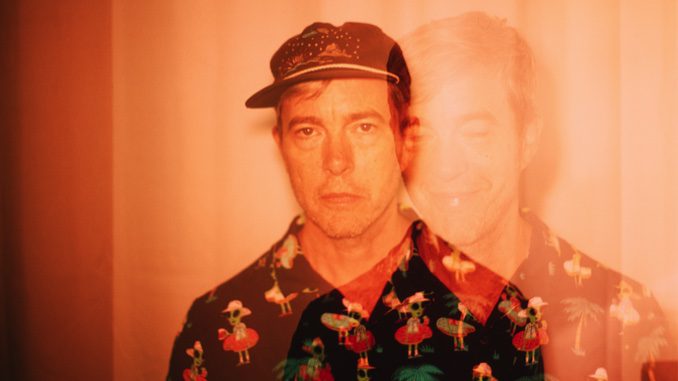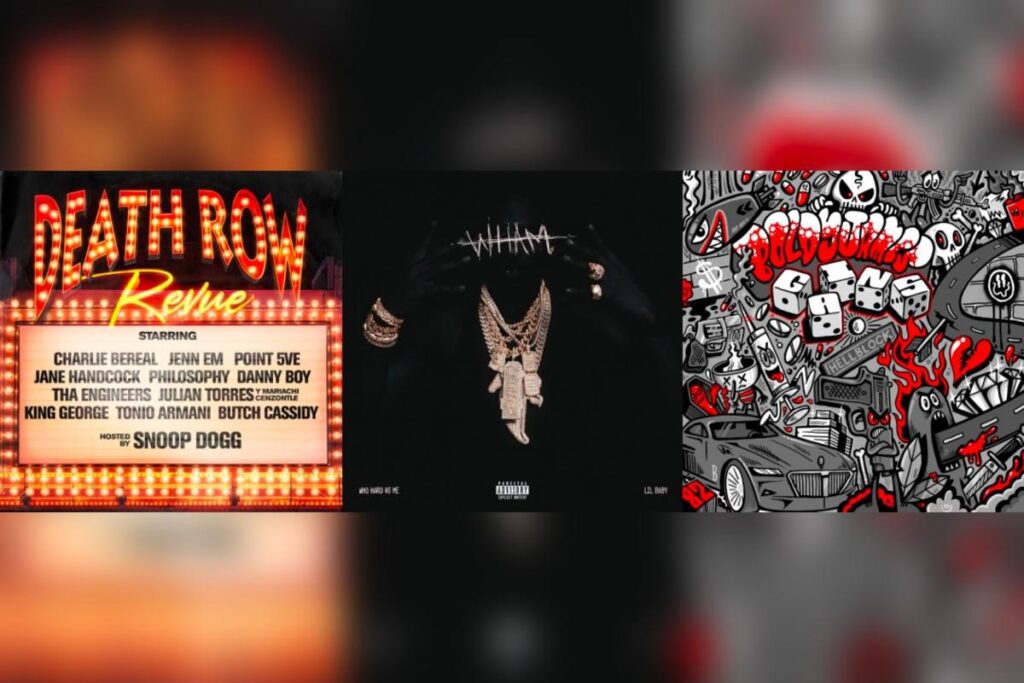Three days after releasing his critically acclaimed, mammoth double album Shepherd in a Sheepskin Vest in the summer of 2019, apocalyptic folk singer and gothic Western purveyor Bill Callahan decamped to Estuary Studios in his hometown of Austin, Texas, to make what would become his seventh solo album, Gold Record. Before it hit shelves nearly a full year later, Callahan elected to release nine of the record’s 10 tracks as singles, many of which play into the same acoustic alchemy and rarely make any daring turns—but that was the point. It was a simple, singular record written, performed and mixed in a week, an exercise in a practice Callahan had learned early on in his tenure with longtime label Drag City. “It got ingrained in me from the start, at least when I started working in studios, to be as fast as you can, record it and make it as quick as you can, so that you spend the least amount of money,” he says. “I think, once you get habits like that, it can be hard to break them.”
Though the rollout of Gold Record was unusual and expedited, the record itself was a testimony to empathy featuring some of Callahan’s warmest, boldest songs to date—a character study and Western serial of oddballs born in dreams. Its predecessor, Shepherd in Sheepskin Vest, was a perfect folk record about becoming a new husband and a new father that also welcomed meditations on the violence of masculinity, the slouching detriments of isolation and how the goodness of the women we love can sometimes right the ship of us misguided men. Since his days performing under the Smog stage name, Callahan has long been at odds with his own mortality, trying to make sense of a world that’s rambling forward with or without him. And perhaps that is what has allowed his work to endure for so long, the small gift that is Callahan’s cruel vulnerability about how far behind he can be, or how unsure he is of what future awaits him. Gold Record would abandon its predecessor’s wide arrangements, trading synthesizers, organs and elaborate percussion for minimal instrumentation and Callahan’s patient narration.
But Callahan’s eighth studio album, YTILAER, is as far from Gold Record as Gold Record was from Shepherd in a Sheepskin Vest two years ago. He begins with a murmur on “First Bird”: “And we’re coming out of dreams / As we’re coming back to dreams.” What those dreams were is unknown, but Callahan’s got one foot in each. He’s himself and someone else concurrently; both the songwriter and the song. In the five years between Have Fun With God and Shepherd in a Sheepskin Vest, Callahan got married and started a family; in the two years between Gold Record and YTILAER, he’s done what a good many of us have done: attempt to make a story out of staying home, rekindling hope with our closest companions.
YTILAER was first conceptualized when the pandemic came to, as Callahan calls it, a “fake ending” over a year ago, when people were announcing that it was time to open up the country and go back to normal. In the period between then and when the next wave of the virus arrived and lockdown resumed, Callahan blueprinted the album’s architecture. “I wrote these songs during that period, when [the pandemic] seemed to be over and I was like, ‘Okay, I need to lift people up. They’re gonna be coming to a club, maybe, for the first time since the pandemic, and there’s so much turmoil in social media and politics,’” he says. “I felt like I needed to write some songs that blew all of that shit away for myself and for anyone who might find it appealing.”
The songs on YTILAER are not apolitical so much as they are momentary distractions from the real-world strife that plagues our news pages. Callahan flips our quarantined perceptions on their head across the record, especially on “Everyway,” when he sings, “I feel something coming on / A disease or a song.” Though they have escapism in mind, these aren’t dance songs, though you might catch a couple of vinyl punks grooving to “Natural Information” in record store aisles.
Though it’s not immediately evident in lead single “Coyotes,” YTILAER is Callahan’s broadest palette of sonic work in years. The sparseness of Gold Record might have signaled that Callahan was making a shift toward a softer, Greenwich Village busker type of aesthetic, but that was never the case. “I started becoming more interested in rock music again, so I started thinking more in terms of a band type of record,” he says. “It seemed like, after the pandemic, I needed all the help I could get to make a little noise.” Ushered into the fold were guitarist Matt Kinsey, Cairo Gang bassist Emmett Kelly, pianist Sarah Ann Phillips, Dirty Three drummer Jim White, contra alto clarinetist Carl Smith, and brassists Mike St. Clair and Derek Phelps.
Pushing back against that mantra of haste he learned in his early studio days, Callahan took his time making YTILAER. The end result clocks in at 62 minutes, two shy of Shepherd in a Sheepskin Vest, but with eight less songs. “YTILAER was a breakthrough for me, because I had to let go of that drive to keep moving forward,” Callahan says. “I still haven’t quite learned, really. I just tried to tell myself that I was Led Zeppelin and I had a year in the studio. The early behavior, it’s like when you’re a teenager or in your early 20s, and you’re just learning how to get things done. It’s imprinted on me. It’s my childhood. It’s the early records. Now that I’m an adult, I don’t need to do that.”
Callahan’s own orthodoxy is singular. Few musicians have the capacity, or the bravado, to pair such wildly distinct songs next to each other on a tracklist. Take “Partition,” for example, a hollering, baroque tale about the human condition and Adam taking “God’s woman,” and its partner, “Lily,” a gentle, everlasting ballad about a now-deceased loved one. “You showed me Middle C / And how you wept inside / Crying like a cold apple cries,” Callahan sings on the latter. These two songs should clash, but instead, they flow into and enrich each other. They tell different stories through different sounds, lamenting a type of loss lurking on each side of the spectrum, the universal and the personal, and existing beyond the typical parameters of a pop song.
What’s real and what isn’t forms the backbone of YTILAER. The line, no matter how indelibly drawn it appears, remains blurred. In closer “Last One at the Party,” Callahan sings in third-person about some guy with “eyes like typewriters” who holds “all the poetry you’ll ever know.” In a 2019 interview with Vish Khanna on his podcast Kreative Kontrol, Callahan talked about what inspired him to move to Austin from Chicago in the early 2000s. He noted that doing some in-store performances and enjoying the hospitality of Texans he’d never even met as something that turned him on to the city. “The locals [in Austin] were very friendly and I got invited to a party,” he told Khanna. “I was living in Chicago for six years and nobody invited me to a party the whole time I was there.” Whether the man at the center of “Last One at the Party” is actually Callahan is open to interpretation, but one thing is clear: He’s never been so comfortable in his own story.
The truth isn’t very romantic. Gold Record was mostly fictional and Shepherd in a Sheepskin Vest was mostly autobiographical. The question of how much of YTILAER is memoir beckons a coded answer from Callahan. He isn’t quick to reveal any particular secrets, nor should he be. “Everything is autobiographical, as long as you permit me to be living hundreds of autobiographies at once,” Callahan says. “We have amazing control over our mindset, as people, and, to realize that, it’s a good way to feel better or more connected with yourself in the world.” This sort of philosophy arises in poetry often, as readers must wrestle with whether to separate the writer from the speaker of the poem. Interpretation can lead us down many paths, but most of them find their way back to the person holding the pen.
“I think songwriting is somewhat similar, in that, as you’re writing, you’re making a little world up for four or five minutes that is true and autobiographical,” Callahan adds. “But, there’s also, like, 100 other things that could’ve been written that would also have been true and autobiographical. That might seem contradictory to each other, but I think they’re all true, because humans are complex.”
The act of writing is one that arises in numerous points across Callahan’s career. In 2010, Drag City published his epistolary novel, Letters to Emma Bowlcut. On Shepherd in a Sheepskin Vest, his song “Writing” casts a winking eye on the act of breaking through burnout and writer’s block. On YTILAER, he uses writing to combat grief: “I started writing your death song / Long before you were gone / You could have had a life / Not under my pen.” For Callahan, it’s about perspective and putting a spin on who’s in control. Specifically, it’s about introducing as many perspectives from as many protagonists as any given song will allow, even if everyone in question is Callahan himself. “It’s like in The Wizard of Oz,” he reasons. “When the screen reveals a little man who’s controlling everything, it’s like that type of moment, just a total perspective shift.”
Though Woke on a Whaleheart sounds eons different from Dream River, and so on, the exercise of building an album always begins the same way for Callahan: with an inciting idea that fits in the palm of his hand. “It usually starts with just a word or phrase,” he says. “A couple of words that I recognize, in them, that there is something that’s like a seed. It’s like you’re holding an acorn and you think, ‘This one could be a big oak tree, eventually, if I plant this.’ It’s like, I have the tiniest little thing, but I always know that this is the start of it. This is the seed.”
Though the throughlines of YTILAER might venture away from the record’s core, the question of what’s real and what isn’t, and take off into their own territories—like dead seagulls falling out of open mouths, horses entranced by anonymous beauty and farmers bartering with merchants for meat—they are each nuanced and tender. Callahan is theatrical in the sense that he is both a showman and a wordsmith. Unlike artists who might throw caution to the wind and journey into a song without a finished arc in tow, if Callahan doesn’t have a full story ready, he’s reluctant to press on. “I’m never really satisfied until there’s a story there,” he says. “That’s the only way that I know I’m okay with signing off on myself. I think other people can pull off suggesting a story, but I always feel like I’m not good at that. I need to have a whole story there.”
For the first time since Have Fun With God in 2014, Virginian painter and art critic Paul Ryan painted an album cover for Callahan. The front of YTILAER is adorned with a semi-abstract rendering of a colorful bird. It might be a scarlet macaw, or maybe a rainbow lorikeet, but for Callahan, it symbolizes atmosphere and nature more than it does any particular habitat or species. “It’s like the weather,” he says. “When there’s a cloudy sky in [Ryan’s] paintings, I expect to start feeling raindrops. I try to have that immediacy, or that tactile nature, in the music. I think of it as something very natural sounding or human sounding.” Much like the album itself, the image that represents the songs is a nod to not who we are as we tumble through life, but rather what comprises the land we roam across.
No one has ever compared Callahan’s catalog to that of a rock band touched by the heavens of fame and glory. His folky pluckings do not sell out 50,000-capacity stadiums, and he’s fine with that. Not overselling his own mythology helps maintain the mystery of his work, and keep the charm of his early-’90s, lo-fi cassette tape roots intact. “If you do a lot of production on a record, it can shift away from the human to, I would even say, ‘godlike,’” Callahan says. “There’s arena-rock bands, like Journey and Boston, where the music sounds like it’s coming from the gods. It doesn’t really sound human-derived. I do enjoy that type of thing, listening to it. But, as far as my own music, I try to keep it as ungodlike as possible.”
Though Callahan never tries to recreate anything he’s already done on previous records, parts of YTILAER call back to different segments in his catalog. “First Bird” and “Coyotes” return to the textures of Shepherd in a Sheepskin Vest; “Bowevil” is akin to Apocalypse; “Lily” boasts a Dream River-esque elegance. As Callahan puts it, he tries to avoid having moves in his work, but if something works, he’ll usually do it again. In turn, the parts of YTILAER that are familiar don’t feel exhausted or redundant. They are mementos, siphoned from the same licks of inspiration as the best ones from previous expeditions. Some of his old friends and loved ones are gone, some of them still growing. Callahan himself is a wayfaring traveler, still learning about himself, but never straying too far from the stories of long ago. On YTILAER, he’s firmly getting acquainted with the life of old, or at least what parts of it still remain.
YTILAER
is out Friday, Oct. 14, on Drag City Records.
Matt Mitchell is a writer living in Columbus, Ohio. His writing can be found now, or soon, in Pitchfork, Bandcamp, Paste, LitHub and elsewhere. Find him on Twitter @matt_mitchell48.
Revisit Bill Callahan’s 2011 Daytrotter session below.




